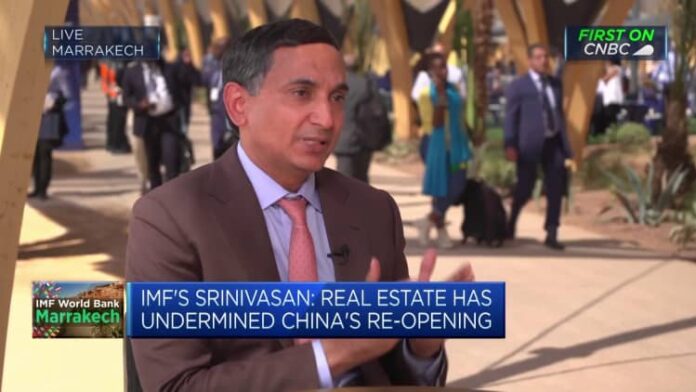China’s economy will grow 5% in 2023, down from a previous forecast of 5.2%, according to the IMF’s October update to the global economic outlook.
Future publishing | Future publishing | Getty Images
According to the International Monetary Fund, China’s old economic model that relied on real estate investment has “run its course” and the government needs to consider boosting consumption to drive the recovery.
The slowdown in the real estate market is the main reason for China’s slowdown, said Krishna Srinivasan, director of the IMF’s Asia and Pacific department. “There has been no comprehensive response to the problem and this has weighed on both real estate investment and consumer confidence.”
Although China has tried to rebalance its economy and focus more on consumption-led growth, demand remains weak and is no longer growing as quickly as before the pandemic.
“One would have hoped that consumption would pick up very strongly once China reopened, but that has been undermined by the failure to return confidence in the real estate sector,” Srinivasan said. “A lot of the wealth is in the real estate sector, and that hasn’t been resolved yet.”
The IMF cut its growth forecast for China’s economy in 2023 from 5.2% to 5% in its October update to its World Economic Outlook. In addition, the forecast for 2024 was lowered from 4.5% to 4.2%.
Slower growth in China is an “important risk to the global economy,” the report said.
The IMF expects global growth to slow from 3.5% in 2022 to 3% this year before falling further to 2.9% in 2024.
“Growth remains slow and uneven, with growing global divergences. The global economy is limping forward, not sprinting,” the fund said.
Consumption remains weak
Some economists are more pessimistic about China’s recovery than the IMF and expect China’s economy to grow even more slowly this year.
“The IMF’s view is not that pessimistic,” said Erica Tay, director of macro research at Maybank.
She said the bank had downgraded its growth forecast for China to 4.8% this year because it did not see the same engines that drove China’s growth so strongly in the first half of the year.
“We are concerned about consumption in the next few quarters. Revenge spending is already starting to slow and consumer spending is expected to settle at weaker levels than before the pandemic,” Tay told CNBC.
Passengers arrive at Beijing Railway Station on the first day of the peak travel period ahead of the National Day holiday in China’s capital, September 29, 2023.
Jade Gao | Afp | Getty Images
Tay noted that signs of “revenge fatigue” were visible even during China’s major Golden Week holiday in the first week of October.
Maybank forecasts the country’s consumer sector will grow by about 6% this year and 4% in 2024.
“Durable goods consumption is much lower than expected because people are worried about their future. So why buy a car if you don’t know what will happen next month? Why buy a home if you don’t know what’s going to happen next year,” said Alicia Garcia-Herrero, chief Asia Pacific economist at Natixis.
It’s not just the economic scars of the pandemic, she said: “It’s all structural. As your economy ages, you consume much less and don’t have great expectations for the future.”
A different story for India
In contrast, the fund expects the Indian economy to grow 6.3% in 2023, up from a previous forecast of 6.1%.
“India is on the map. There is a lot of catching up to do and the mood is very positive. There is a feeling that India is back at the forefront and the propaganda in the media is also encouraging consumption,” said Garcia-Herrero.
While the IMF stuck to its forecast of 6.3% growth for India in 2024, economists said the country faces a lot of headwinds.
“A widening current account deficit, rising inflation and rising geopolitical tensions would be the biggest headwinds for India,” Garcia-Herrero warned.
















